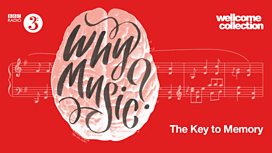
Why Music? The Key to Memory
Jeremy Summerly joins Andrew McGregor live for a 'blind' Building a Library discussion and the results of an experiment on if the 'reminiscence bump' dictates favourite recordings.
with Andrew McGregor
Live from Wellcome Collection as part of Why Music? The Key to Memory, a weekend of events, concerts and discussions exploring the implications of music's unique capacity to be remembered.
0930
Conductor, academic, broadcaster and record producer Jeremy Summerly joins Andrew live for a 'blind' Building a Library discussion comparing recordings of Purcell's glorious Coronation Anthem 'My Heart is Inditing' (Z30). Neither Jeremy nor Andrew will have been told which recording is which, either in their preparation or as they listen live on air, in an attempt to bypass any preconceptions and compare performances in a different light.
1000
The reminiscence bump refers to the period in your life which you remember most, 15 to 21. Most people's musical tastes are dictated by the reminiscence bump, as cognitive neuropsychologist Catherine Loveday's research has established. Catherine (one of the weekend's resident experts) and her team at University of Westminster have researched listeners' favourite classical music recordings to establish if they too come from that period in their lives and chats to Andrew about her findings.*
*In September, we asked our listeners to name their favourite recordings of the following eight pieces. They were directed to a University of Westminster link where Catherine Loveday's students compiled and assessed the responses.
Beethoven Symphony No. 5
Handel Messiah
Bach St Matthew Passion
Vaughan Williams The Lark Ascending
Stravinsky The Firebird
Holst The Planets
Mahler Symphony No. 5
Mozart Symphony No. 41 'Jupiter'.
Last on
![]()
Cognitive neuropsychology can explain why we return to old favourites again and again.
![]()
Why Music? The Key to Memory
Wellcome Collection hosts a weekend of fascinating programmes on music and the mind.
9am
BACH, J S: St Matthew Passion, BWV244
Trinity Boys Choir, Monteverdi Choir, English Baroque Soloists, Sir
John Eliot Gardiner
Soli Deo Gloria SDG725 (2CD)
SAINT-SAENS: Symphony No. 3 in C Minor, Op. 87
‘Organ Symphony; Carnival of the Animals
Daniele Rossi (organ), Martha Argerich (piano),
Antonio Pappano (piano/conductor), Orchestra dell’Accademia Nazionale di Santa
Cecilia
Warner Classics 0190295755553 (CD)
Two
Little Words
Featuring
music by Michael Head, Marshall Palmer, Alan Murray, Carrie Jacobs-Bond, Joseph
Horovitz, Benjamin Britten, Manuel de Palla, Franz Schubert, Johannes Brahms,
Pyotr Ilyich Tchaikovsky, Madeleine Dring, Stephen Sondheim, John Pritchett,
May H. Brahe
Dame
Felicity Palmer (mezzo-soprano), Simon Lepper (piano)
Resonus
Classics RES10199 (CD)
ANDRIESSEN:
Theatre of the World
Leigh
Melrose (baritone), Lindsay Kesselman (soprano), Marcel Beekman (tenor),
Cristina Zavalloni (mezzo-soprano), Los Angeles Philharmonic, Reinbert de Leeuw
(conductor)
Nonesuch
7559-79361-8 (2 CD)
9.30am - Building a Library
Building a Library: a weekly look at a piece of music, a comparison of the available recordings, and a recommendation.
Conductor, academic, broadcaster and record producer Jeremy Summerly joins Andrew live for a 'blind' Building a Library discussion comparing recordings of Purcell's glorious Coronation Anthem 'My Heart is Inditing' (Z30). Neither Jeremy nor Andrew will have been told which recording is which, either in their preparation or as they listen live on air, in an attempt to bypass any preconceptions and compare performances in a different light.
Building a Library: Purcell's My Heart is Inditing
Recommended Recording:
Collegium
Vocale Gent, Philippe Herreweghe (conductor)
HARMONIA MUNDI HMC901462
Other Recommended Recordings:
New
College Oxford, Edward Higginbottom (conductor)
CRD
CRD3504
10.00am – Dr Catherine Loveday on the Reminiscence bump
The reminiscence bump refers to the period in your life which you remember most, 15 to 21. Most people's musical tastes are dictated by the reminiscence bump, as cognitive neuropsychologist Catherine Loveday's research has established. Catherine (one of the weekend's resident experts) and her team at University of Westminster have researched listeners' favourite classical music recordings to establish if they too come from that period in their lives and chats to Andrew about her findings.
ELGAR: Variations on an Original Theme ‘Enigma’
HOLST: The Planets
London Symphony Orchestra, Geoffrey Mitchell Choir, London Philharmonic
Orchestra, Sir Adrian Boult (conductor)
GREAT RECORDINGS OF THE CENTURY 5677482 (CD)
MOZART: Symphony no. 38 ‘Prague’; Symphony no. 39; Symphony no. 40;
Symphony no. 41 ‘Jupiter’
Scottish Chamber Orchestra, Sir Charles Mackerras
Linn Records CKD308 (2CD)
MAHLER: Symphony no. 5
Vienna Philharmonic Orchestra, Leonard Bernstein
DG Grand Prix 4776334 (CD)
EJ MOERAN: Concerto for Violin and Orchestra
DELIUS: Légende
HOLST: A Song of the Night
ELGAR: Chanson de Matin; Chanson de Nuit; Salut d’amour
VAUGHAN WILLIAMS: The Lark Ascending
Tasmin Little (violin), Â鶹ԼÅÄ Philharmonic, Sir Andrew Davis (conductor)
CHANDOS CHAN10796
Stravinsky conducts Stravinsky: The Ballets
STRAVINSKY: The Firebird; Scherzo a la Russe; Scherzo
Fantastique, Op. 3; Fireworks, Op. 4; Petrushka; The
Rite of Spring; Les Noces; Renard; Histoire du Soldat; Apollon musagète; Agon;
Jeu de cartes; Scènes de ballet; Bluebird Pas de Deux; The Fairy's Kiss; Pulcinella
Columbia Symphony Orchestra, Igor Stravinsky
Sony
88697884142 (7 CD)
BEETHOVEN: Symphony no. 5; Symphony no. 7
Vienna Philharmonic Orchestra, Carlos Kleiber
Deutsche
Grammophon 447 4002 (CD)
10.45am – Disc of the Week
HANDEL: Messiah, HWV 56 (1754 Version)
Rupert
Charlesworth (tenor), Andreas Wolf (bass-baritone), Sandrine Piau (soprano),
Anthea Pichanick (contralto), Katherine Watson (soprano), Concert Spirituel
Orchestra, Concert Spirituel Chorus, Herve Niquet (conductor)
ALPHA
ALPHA362 (2 CDs)
Broadcast
- Sat 14 Oct 2017 09:00Â鶹ԼÅÄ Radio 3
Composers A to Z
Browse previous episodes of the Record Review Podcast
Why the music we love as teens stays with us for life
Cognitive neuropyschology can explain why we return to old favourites again and again.




